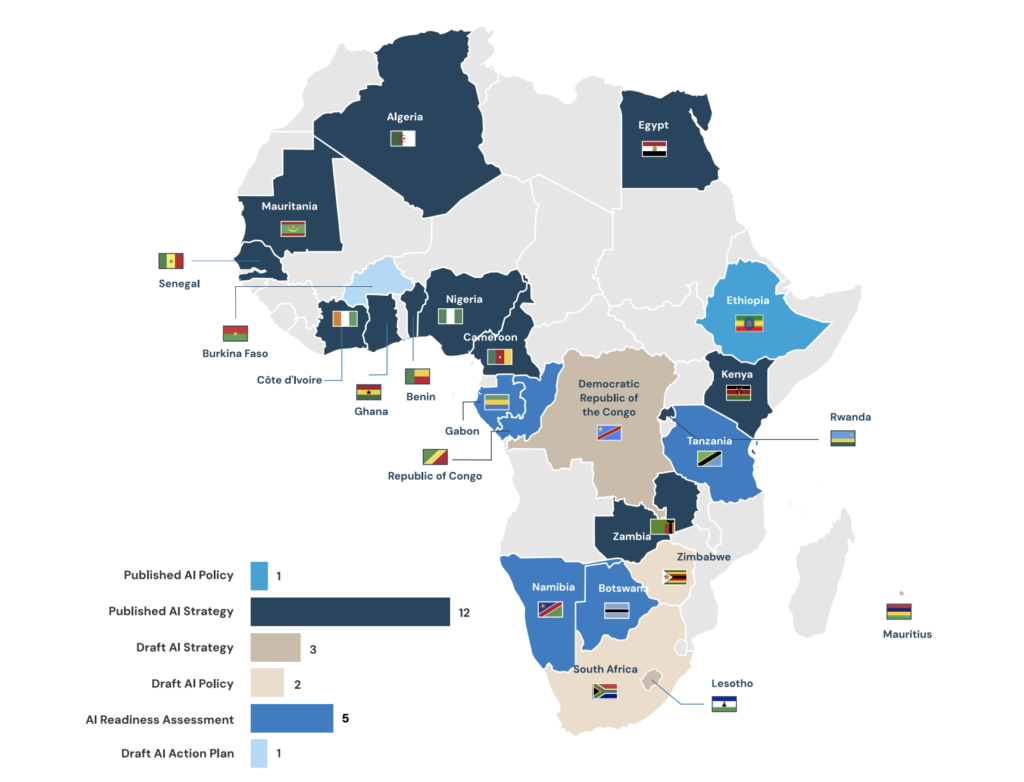A new continental assessment of artificial intelligence policy reveals that while many African nations have drafted ambitious AI strategies, few have transformed them into tangible results. The State of AI Policy in Africa 2025 report, authored by Mo Shehu, PhD, and Gideon Onunwa, paints a picture of uneven progress across the continent — with a handful of leaders and a long tail of countries still struggling to move beyond policy rhetoric.
“The findings show a clear divide between ambition and execution,” the report states. “Over half the reviewed countries have published or drafted national AI strategies, but only a fraction have attached budgets, laws, or monitoring frameworks.”
Leaders: Egypt, Ethiopia, and Kenya Take the Lead
According to the study, Egypt and Ethiopia are the most advanced in developing and implementing AI policy. Both nations “score highest, having strong institutional anchors and visible pilot projects,” linking their AI frameworks to broader national development goals.
Kenya ranks closely behind, buoyed by its $1.1 billion budget for AI and growing international partnerships. “Kenya and Senegal stand out for scale and financing,” the authors write, “but both lack strong legal enforcement and public monitoring.”
Egypt’s national AI council and Ethiopia’s integration of AI into their digital transformation plans are cited as examples of institutional continuity — a critical factor in ensuring that AI policy survives political transitions.
Middle Performers: Policy Continuity but Weak Enforcement
Mauritius, South Africa, and Ghana are commended for maintaining “policy continuity, active consultation, and visible projects,” but the report warns that these countries “remain weak on legal codification and M&E systems.”
Nigeria’s approach reflects both promise and limitation. “Nigeria demonstrates strong participation and implementation through local language models and scaling hubs but lacks dedicated funding and statutory backing,” the report says.
The authors highlight Zambia as a model for smaller economies, noting that it “shows how smaller economies can still achieve meaningful progress through institutional focus and early rollout.” Zambia’s example demonstrates that size and GDP are not the only determinants of success — strategic focus and collaboration matter just as much.
The Lagging Nations: Stuck in Drafts and Donor Dependency
At the lower end of the spectrum, Namibia, Botswana, and Zimbabwe are described as “still in the drafting stage, where discussions remain largely conceptual and fragmented across ministries.” Progress in these countries is driven more by donor partnerships and university consultations than by direct government funding.
The report finds that 34 other nations — including Chad, Eswatini, Sierra Leone, and the Central African Republic — “have not yet released any AI-related policy or roadmap.” For these states, the authors argue, “the starting point will likely be establishing a baseline understanding of AI’s relevance and coordinating regional support to avoid isolation from continental efforts.”
Four Weak Links: Funding, Monitoring, Law, and Ethics
Across the 20 countries studied, the report identifies recurring weaknesses:
-
“Weak funding models.” Few governments have multi-year budgets; most rely on donor support or general ICT allocations.
-
“Limited monitoring and evaluation.” Few strategies include indicators or reporting systems to track progress.
-
“Gaps in law and enforcement.” While 35 African nations have data protection laws, very few have AI-specific regulations.
-
“Ethics without accountability.” Although many policies include ethical principles, they rarely translate into binding institutional rules.
The authors warn that the result is “uneven progress: ambitious frameworks without the institutional or financial backbone to sustain them.”
Transparency is a major concern. “Many strategies remain invisible to the public, with limited consultation or published updates,” the report notes, adding that this reduces both citizen trust and policy accountability.
The Promise of AI: Economic Opportunity Meets Policy Paralysis
Artificial intelligence is already reshaping how Africa works, farms, and governs. The report argues that the technology “presents both an opportunity and a test of leadership.”
“AI-driven tools can already be seen transforming agriculture, healthcare, education, and financial inclusion,” it says. “Farmers use predictive models to forecast yields and manage pests; health workers apply diagnostic algorithms to expand care in under-resourced regions; and fintech startups use AI to extend credit to unbanked populations.”
Governments are also beginning to use AI for “court automation, data-driven service delivery, and public accountability.”
But the report stresses that policy immaturity could stunt these early wins. Without regulatory clarity, local innovation risks being overshadowed by foreign tech giants. “Countries that shape the technology also shape the rules,” Shehu and Onunwa write. “Africa’s participation in this new landscape is essential to ensure its needs and perspectives are represented.”
The Way Forward: From Strategy to Law
The report urges governments to shift their focus from drafting AI strategies to implementing and enforcing them. “The next phase is less about drafting new strategies and more about implementation, evaluation, and collaboration,” it concludes.
Key recommendations include embedding AI policies in law, expanding public participation, building strong ethical frameworks, and making monitoring data public.
Ultimately, Shehu and Onunwa argue that Africa’s AI race is not one of lateness but of durability. “Africa is not behind — it is early,” they write. “The task now is to make ambition durable: to move from promise to proof.”
That transition — from vision to verification — will determine whether AI becomes Africa’s engine of equity or yet another missed technological revolution.





